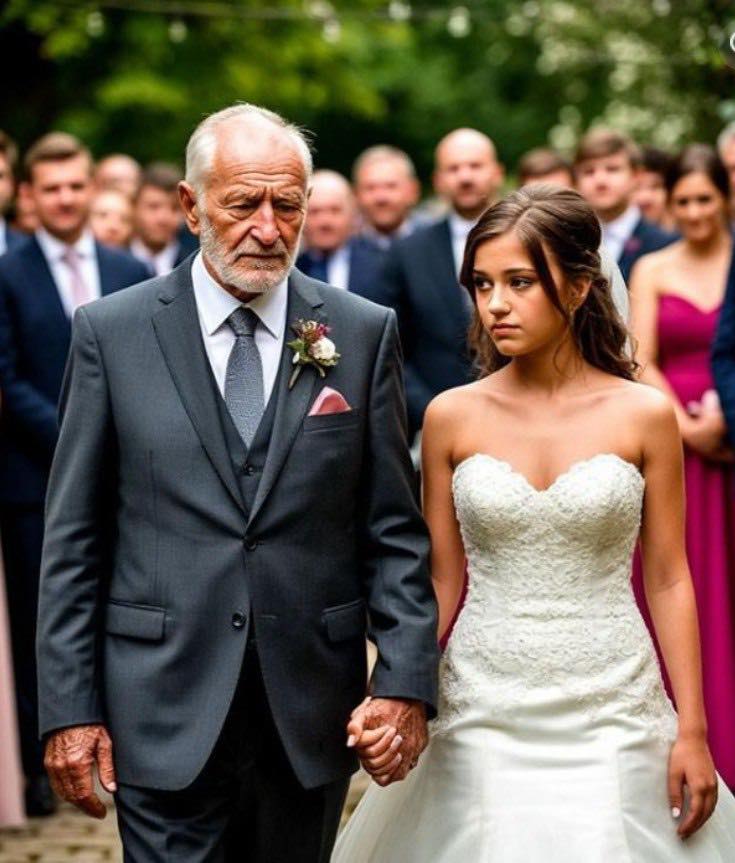An older man walked unsteadily toward the main entrance of an elegant restaurant.
His suit was well-pressed, but visibly worn—he’d probably worn it years ago and had put it back on today after a long time.
His gray hair fell in fine strands on his head, as if he no longer knew where to stay.
He paused at the door, looked at himself in the tinted glass, straightened his collar, took a deep breath, and entered.
As soon as he crossed the threshold, he bumped into the security guard. The guard looked at him as if seeing a ghost from the past.
“And who are you?” the guard snorted. “Do you think this is a social service or a charity?”
“I’m here for a wedding…” the old man replied in a low voice.
“My daughter’s getting married today…” The edges of his lips curved slightly in a bitter smile.
The guard frowned, said something into his radio, and cast suspicious glances at the guest.
The man tried to peer into the room through the glass walls, but couldn’t see anything—the wedding was clearly taking place in another part of the restaurant.
After a minute, two men in tight suits approached him. Without saying anything, they took him by the arms and led him to a staff room.
“What are you doing here?” A woman pushed him away as if he were a useless object. “Go away! You don’t belong here!”
“I’m sorry… I just wanted to see my daughter…”
It turned out they were the groom’s parents. They found it hard to believe that this man was related to the bride.
“We’re all important people here,” the woman said coldly, straightening her designer jacket. “But you… who are you?”
“Good question,” the man said calmly.
“But totally unnecessary,” she added.
“Look around you: these people came to celebrate, not to see other people’s misfortune. Leave before you ruin the atmosphere.”
The more he talked, the more aggressive she became—she clearly liked being in control.
“Vasili Igorevich,” the old man introduced himself and extended his hand.
She didn’t even look at his hand; she stepped back a little further, as if afraid of catching his poverty.
When he realized they wouldn’t let him into the party, Vasili Igorevich began to explain:
“I didn’t come for food… The trip was long. Almost my entire pension went on the ticket…”
That only made them more suspicious.
“Then wait a moment,” the woman said suddenly in a softer tone. “We’ll gather some leftovers from the kitchen. That way you can eat something on the way back.”
“I didn’t come for that,” he said with dignity. “I don’t need anything… I just want to see Janotschka.”
“He just wants to see her,” her husband mockingly imitated. “We pay for everything, we organize everything, and he comes just to take a look!”
“She’s like a daughter to us!” the woman exclaimed. “She’s marrying our son! She’s part of our family now!”
“And you think you can just walk in and be accepted? No one knows you, and here you are!”
She gave him a disdainful look and lingered over his clothes.
“Maybe you’re not even the father of the bride. Just someone who wants a free lunch?”
The man looked down, hid his wrinkled hands between his knees.
He looked at his old but shiny shoes, then at the immaculate leather shoes of the man in front of him, and sighed deeply.
Finally, he accepted the “leftovers.”
The groom’s parents exchanged a look—they were right.
The woman nodded and they headed into the kitchen, leaving the old man alone.
But Jana was his daughter. He hadn’t seen her in 25 years.
He didn’t deny it was his fault. He understood why they were condemning him. But the past can’t be changed.
“If people knew how their decisions would end, maybe they’d act differently,” he thought. As they say, “If you knew where you’d land, you would have put straw.”
Twenty-five years ago, he said goodbye to little Jana, not knowing it would be forever.
He was 48, his wife 46. Children born late—a long-awaited happiness. But life decided differently. His wife fell ill with cancer.
The treatment cost not only strength but also money. After her death, he was left alone with the child.
His job was hard and poorly paid. The house needed maintenance, his daughter needed care.
He read somewhere that Norway was a paradise for children. High benefits, help, protection. But how would he live?
Who would take care of Jana if he took on several manual labor jobs?
The climate was harsh there. What if she couldn’t stand it?
He didn’t want her to grow up in poverty and loneliness.
Deeply depressed, he signed papers to send her to boarding school.
Everything was a blur—confused thoughts, a broken heart.
When he left her that day, his heart shattered into a thousand pieces.
Every night he saw her tears, her outstretched little hands, her plea: “Daddy, don’t go.” He didn’t want to leave her—not for a second.
He planned to return after six months. Work, buy gifts, fix up the house. He thought: I’ll look for her, we’ll start over. Together.
But when he returned, he heard the terrible truth.
The boarding school was closed, the children scattered across several cities.
